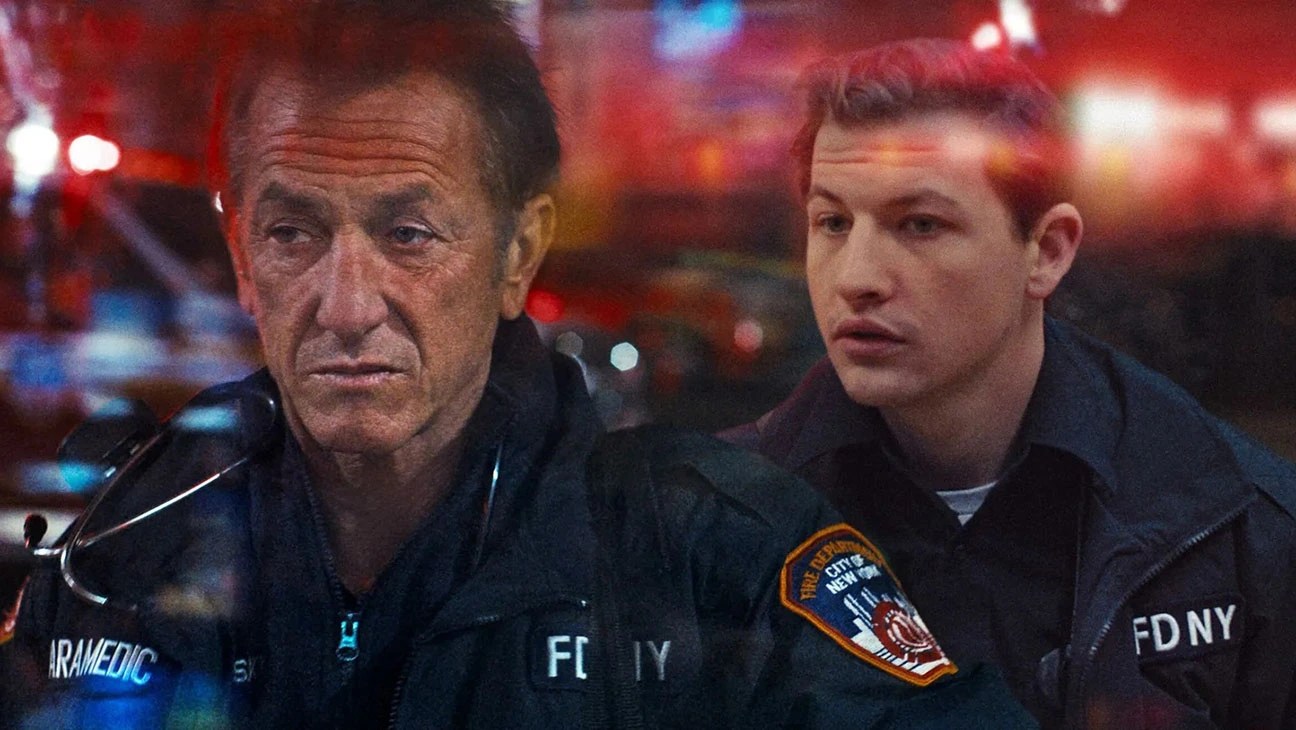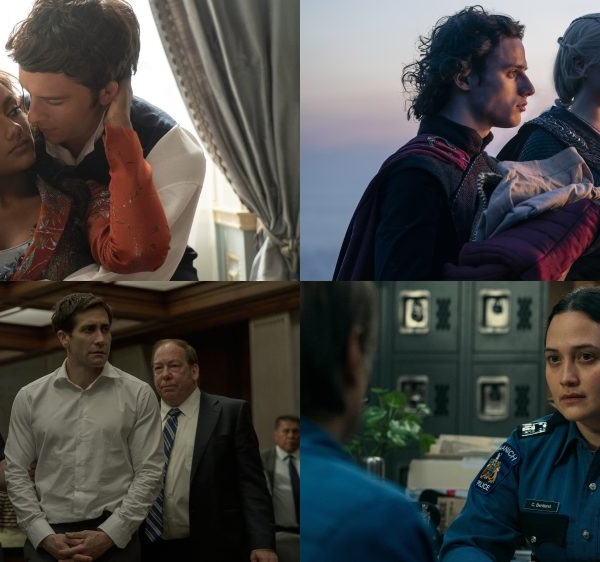Editor’s Note: This review originally published during the 2023 Cannes Film Festival, when “Asphalt City” was titled “Black Flies.” Vertical Entertainment and Roadside Attractions will release “Asphalt City” in U.S. theaters on March 29, 2024.
Forget banging pots and pans outside of your window at 7 p.m. every night, Jean-Stéphane Sauvaire’s “Black Flies” is here to give New York City’s paramedics the tribute they deserve. And this isn’t the kind of kumbaya, we’re all in this together, let’s honor the real heroes celebration that helped civilians feel like they were doing their part during the worst days of the pandemic. No, this is a hardcore, dead behind the eyes, I’ll see you in Hell salute to the medical technicians who risk their humanity to save other people’s lives; it’s a movie that wants to make “Bringing Out the Dead” feel like “Barb and Star Go to Vista del Mar.”
We’re talking Sean Penn as a grizzled first responder who’s losing his faith, and Tye Sheridan as the pure-hearted rookie partner who gets so deep in the shit that he starts choking his nameless girlfriend during sex. We’re talking Michael Pitt in full “I’m walkin’ here!” mode as an EMT who likes to play god as soon as he gets a patient inside of his ambulance, and Mike Tyson — perfectly convincing in the few moments he’s on screen! — as the captain who’s in charge of holding this operation together. We’re talking abused dogs, eight seconds of sunlight, and a half-drowned corpse so horribly decomposed that you’ll turn to your date and whisper “those are the black flies” only to realize that they walked out 20 minutes earlier.
As might be expected from the France-born, Bushwick-based director who’s made his name on well-crafted misery spirals like 2017’s “A Prayer Before Dawn,” Sauvaire’s “Black Flies” is such an unrelentingly bleak look inside the busted gut of the American healthcare system that its posturing honesty soon curdles into something that’s hard to believe. Paramedics might welcome a film that shines a harsh light into the darkest recesses of their work — a film that isn’t afraid to explore the toll that it takes, the pittance that it pays, or the thanklessness that it offers them at the end of even the most brutal shift — but this clumsy marathon of plotless miseries is so grueling and one-note that it seems determined to numb us more than the job itself ever could.
“Black Flies” is based on Shannon Burke’s 2008 novel of the same name, and I will do that book the kindness of assuming that Ryan King and Ben Mac Brown’s screenplay has sanded away many of its subtleties. Sauvaire’s movie begins with fresh-faced rookie Ollie Cross (Sheridan) waking up from a bad dream in the back of an ambulance and launching directly into a living nightmare somewhere in Brownsville or East New York. If the character’s last name doesn’t sufficiently convey his street-level Jesus complex, maybe it would help to know that he wears a jacket emblazoned with huge golden angel wings whenever he’s off-duty (to match the painting of a fallen angel that he keeps framed in the rundown Chinatown room he’s renting in order to save cash for med school).
That Cross is ready to bear the world’s sick and dying on his shoulders does little to endear him to his new colleagues; nor does the fact that he’s hoping to work his miracles in a white coat somewhere far away from the mean streets of Brooklyn as soon as he passes the MCAT. That makes Ollie a natural foil for his partner Gene “Rut” Rutkokvsky (Penn), who’s been stuck in the job since before 9/11. Rut has either seen it all or stopped looking for what’s left, but despite the crustiness he’s developed over the course of a career that’s cost him more marriages than his most recent ex-wife can count (shout out to Katherine Waterston’s one-scene cameo), he warms to his guileless new partner after Ollie laughs at Rut’s favorite pedophile joke — something to remember the next time you’re trying to break the ice with a paramedic who’s rushing you to the hospital.
Penn may be playing a pencil-thin archetype, but the early stretches of “Black Flies” serve as a potent reminder of his gifts as a performer. His performance nimbly walks the fine line between hardened and heartless, and the movie works best whenever it wonders if Rut will be able to save himself more successfully than he does any of the people he and Cross are called upon to help every night. It’s hardly a spoiler to say that our heroes don’t have a very high success rate, as many of the most vulnerable New Yorkers would sooner die than call for medical care they know they can’t afford.
Indeed, Sauvaire’s characters spend most of the movie shuttling corpses to Wyckoff Heights Medical Center, or clearing unhoused people out of places where their presence is unwanted. Occasionally they do something that would seem to qualify as a win (e.g. helping an abused woman whose husband claims she fell down the stairs), but Rut can’t seem to resolve those situations without royally fucking things up on his way out the door. It’s not that he’s bad at his job so much as he’s starting to question the good it’s doing. Cross soon comes to know the feeling, as we infer from the cleansing, frequent sex he has with a woman whose name he never bothers to ask (Raquel Nave). These scenes are presented in an obliquely beautiful meshwork of bare tits and hard thrusting, as gifted cinematographer David Ungaro shoots them in the gauzy and fractured handheld style you might expect from a fly-on-the-wall film that mostly focuses on women as vessels for male trauma.
Despite the obviousness of its narrative trajectory, “Black Flies” is less interested in telling a conventional story than it is in tracing the slow descent from doing the lord’s work to becoming the devil’s envoy (Pitt’s metal-head paramedic illustrates the worst-case scenario, though his performance is just cracked enough to create some interesting textures). What little plotthe movie has to offer only kicks in after Rut and Cross are presented with the opportunity to help a woman — played by captivating “Catch the Fair One” star Kali Ries — deliver her baby. That obviously goes wrong in more ways than you would ever want to imagine, as Rut gets stuck at the crossroads between saving people and sparing them the trouble.
There’s no denying that America’s obscene disregard for the health and safety of its citizens might lead a first responder to believe that they’re on the front lines of an unwinnable fight, but indelicate fiction has a way of making life’s most unbearable truths seem like the stuff of fantasy. After watching this movie swirl down the drain for 90 minutes, the sight of Sean Penn stepping into a decrepit bathroom while holding the fate of a premature, HIV-positive baby in his cragged hands can’t help but feel suffocatingly overwrought; instead of sobering you to attention, the scene only exposes how artificially Sauvaire’s film has blocked out anything that might pull its characters back from the brink.
It’s a choice made in the service of a climactic scene that predictably floods Rut in the light at the end of the tunnel, as “Black Flies” reverses two hours of “you can’t save everyone” in a single swoop by restoring the power of saving anyone at the last minute. Both arguments would have been strengthened by a film that alternated between them rather than using one as a cudgel to beat the other within an inch of its life. But “Black Flies” is too enraptured by the violence it finds in the margins of New York City to meaningfully interrogate the mental stress of healing it; too focused on the constant buzz of sirens and death to rescue anything more nuanced from those layers of white noise.
Grade: C-
“Black Flies” premiered in Competition at the 2023 Cannes Film Festival.







